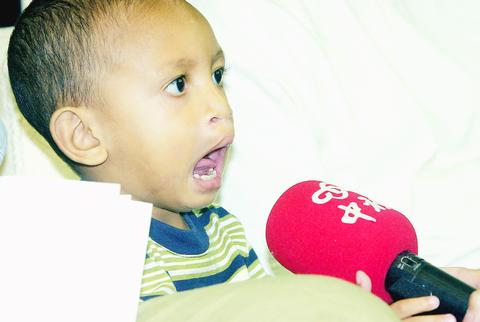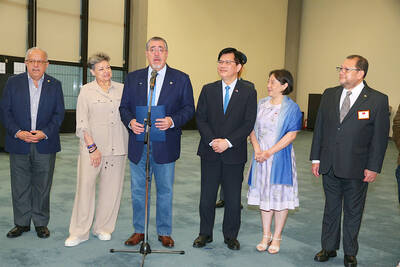The parents of two children from Palau yesterday expressed their gratitude to the people of Taiwan for paying for cranio-facial operations to repair their childrens' cleft palates.
A cleft lip and palate occur when a baby is born with an opening in the roof of their mouth (palate) and the upper lip does not fully form.
"We are very grateful that our baby has been able to benefit from the surgery and to do so for free, because we could never have afforded it," said Mrs. Ngedebuu, the mother of 18-month-old Delson Ngedebuu, one of the children.

PHOTO: CHIANG YING-YING, TAIPEI TIMES
According to the Ministry of Foreign Affairs (MOFA), this was the first time the government has provided free medical treatment to foreign nationals. It did so after receiving a request from the government of Palau, an archipelago nation of some 18,000 people and over 200 islands in the the western central Pacific Ocean.
"Though Taiwan was excluded from this year's World Health Assembly (WHA), we [Taiwan] are willing to give medical assistance when we can to foreign friends in need," Shia Ji-chang (夏季昌), section chief of MOFA's Department of Information and Cultural Affairs, told the Taipei Times.
Taiwan's bid for observer status in the WHA, the highest decision-making body of the WHO, suffered a setback early this week in Geneva, as Taiwan's plea was not put on the meeting's agenda.
Ngedebuu gave her thanks while speaking to reporters as her family and that of the other child, two-year-old Reign Kazuyuki, attended an appointment with the Minister of Foreign Affairs, Eugene Chien (
The minister personally congratulated the families and thanked the Chang Kung Memorial Hospital for successfully carrying out the operations.
"By providing such help to other nations, we are reaching out to the international community and showing the world that the people of Taiwan are mature and responsible citizens of the global community," Chien said.
According to the MOFA, upon receiving the letter from the Palau government in January requesting Taiwan's help in treating the children, the ministry contacted major hospitals seeking volunteer assistance from medical institutions to conduct the operation.
The Palauan government told the ministry that the two children were from poor families and "in serious need of treatment."
Taiwan was approached not only because it has sent doctors to help in Palau's hospitals before, but also because no hospitals in Palau have expertise in cranio-facial surgery.
The Chang Kung Memorial Hospital was the first to respond and conducted the two operations on May 8.
Cleft lip and palate occurs in one of every 500 to 1,000 babies. It is one of the most common birth defects.
Doctors and scientists know how cleft palates form, but they do not have a complete explanation for why clefts occur, or what causes them.
A combination of the child's inherited traits and the environment within the mother's womb during pregnancy is thought to be the most likely cause of clefting in infants. In some way, the growth and development of the face are disrupted, resulting in a cleft.
Asked whether the operations signaled that Taiwan would provide free medical treatment to all foreign nationals who came begging, Shia told the Taipei Times that requests would be dealt with on a case-by-case basis, taking into account the patient's financial circumstances and whether his or her country could provide the treatment.
He said that if Taiwan had the necessary degree of medical expertise in the relevant field, the government would be pleased to assist in cases of genuine need.

Greenpeace yesterday said that it is to appeal a decision last month by the Taipei High Administrative Court to dismiss its 2021 lawsuit against the Ministry of Economic Affairs over “loose” regulations governing major corporate electricity consumers. The climate-related lawsuit — the first of its kind in Taiwan — sought to require the government to enforce higher green energy thresholds on major corporations to reduce emissions in light of climate change and an uptick in extreme weather. The suit, filed by Greenpeace East Asia, the Environmental Jurists Association and four individual plaintiffs, was dismissed on May 8 following four years of litigation. The

A former officer in China’s People’s Liberation Army (PLA) who witnessed the aftermath of the 1989 Tiananmen Square massacre has warned that Taiwan could face a similar fate if China attempts to unify the country by force. Li Xiaoming (李曉明), who was deployed to Beijing as a junior officer during the crackdown, said Taiwanese people should study the massacre carefully, because it offers a glimpse of what Beijing is willing to do to suppress dissent. “What happened in Tiananmen Square could happen in Taiwan too,” Li told CNA in a May 22 interview, ahead of the massacre’s 36th anniversary. “If Taiwanese students or

DIPLOMACY: It is Guatemalan President Bernardo Arevalo’s first visit to Taiwan since he took office last year, while Eswatini’s foreign minister is also paying a visit A delegation led by Guatemalan President Bernardo Arevalo arrived in Taiwan yesterday afternoon and is to visit President William Lai (賴清德) today. The delegation arrived at Taiwan Taoyuan International Airport at 4:55pm, and was greeted by Minister of Foreign Affairs Lin Chia-lung (林佳龍). It is Arevalo’s first trip to Taiwan since he took office last year, and following the visit, he is to travel to Japan to celebrate the 90th anniversary of diplomatic relations between the two countries. Arevalo said at the airport that he is very glad to make the visit to Taiwan, adding that he brings an important message of responsibility

About 3,000 people gathered at events in Taipei yesterday for an annual candlelight vigil commemorating the 1989 Tiananmen Square Massacre, a brutal crackdown by Chinese authorities on a student-led demonstration in Beijing on June 4 36 years ago. A candlelight vigil organized by the New School for Democracy and other human rights groups began at 7pm on Democracy Boulevard outside Chiang Kai-shek Memorial Hall, with the theme "Resist Transnational Repression, Defy Totalitarianism." At about 8pm, organizers announced that about 3,000 people had attended the event, which featured brief speeches by human rights advocates from Taiwan and China, including Hong Kong, as well